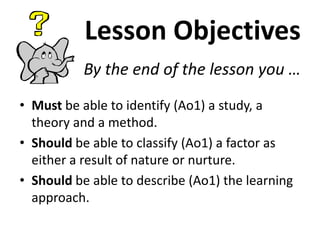
Learn key concepts of psychology lesson on learning approach
- 1. Lesson Objectives By the end of the lesson you … • Must be able to identify (Ao1) a study, a theory and a method. • Should be able to classify (Ao1) a factor as either a result of nature or nurture. • Should be able to describe (Ao1) the learning approach.
- 3. Approach An approach is a perspective (i.e. view) that involves certain assumptions (i.e. beliefs) about human behavior: the way they function, which aspects of them are worthy of study and what research methods are appropriate for undertaking this study. There may be several different theories within an approach, but they all share these common assumptions. Social Approach Cognitive Approach Learning Approach Psychodynamic Approach Biological Approach
- 5. Theories Classical Conditioning Operant Conditioning Social Learning Theory A theory is a based upon a hypothesis and backed by evidence. A theory presents a concept or idea that is testable. In science, a theory is not merely a guess. A theory is a fact-based framework for describing a phenomenon. In psychology, theories are used to provide a model for understanding human thoughts, emotions and behaviors.
- 6. Approach Theories Studies Methods Learning Approach Operant Conditioning Classical Conditioning Social Learning Theory
- 7. Studies Bandura (1961) Watson and Raynor (1920) A study is conducted to investigate if a theory should be supported. Every theory will have many studies that provide different levels of support of opposition for a theory. A study collects data and will have participants who complete a tasks or are observed in the real world. A study should have an AIM, Procedure, Results and Conclusion that states if the theory is supported or not.
- 8. Approach Theories Studies Methods Learning Approach Operant Conditioning Classical Conditioning Social Learning Theory Bandura (1961) Watson & Raynor (1920)
- 9. Methods Lab experiment Observation Questionnaire Quasi Experiment Natural Experiment … Every study will make use of different methods in the design of the experiment. Studies can use many different methods within one experiment to collect the data that will help support or refute the theory.
- 10. Approach Theories Studies Methods Learning Approach Operant Conditioning Classical Conditioning Social Learning Theory Bandura (1961) Watson & Raynor (1920) Experiments Observations Questionnaires …
- 11. 1. Approach 2. Theory 3. Study 4. Method
- 12. Key assumptions of learning • Psychology should be seen as a science. Theories need to be supported by empirical data obtained through careful and controlled observation and measurement of behaviour.
- 13. Key assumptions of learning • The learning approach is primarily concerned with observable behaviour, as opposed to internal events like thinking and emotion. Observable (i.e. external) behaviour can be objectively and scientifically measured.
- 14. Key assumptions of learning • People have no free will – a person’s environment determines their behaviour
- 15. Key assumptions of learning • When born our mind is 'tabula rasa' (a blank slate).
- 16. Key assumptions of learning • Behaviour is the result of stimulus – response (i.e. all behaviour, no matter how complex, can be reduced to a simple stimulus – response association).
- 17. Key assumptions of learning • All behaviour is learnt from the environment. We learn new behaviour through classical or operant conditioning.
- 18. • Must be able to identify (Ao1) a study, a theory and a method. • Should be able to classify (Ao1) a factor as either a result of nature or nurture. • Should be able to describe (Ao1) the learning approach.
- 19. On a piece of paper and without using your notes brain storm / mind map all that you can remember about the learning approach. Hint: we talked about six different assumptions of the learning approach last lesson.
- 21. Lesson Objectives By the end of the lesson you … • Must be able to describe (Ao1) classical conditioning. • Must be able to identify (Ao1) the different concepts within classical conditioning. • Should be able to describe (Ao1) the basic elements of classical conditioning.
- 22. Ivan Pavlov.
- 24. Classical Conditioning • First Pavlov established that food caused the dog to salivate.
- 25. Classical Conditioning • Then Pavlov established that a tone did not cause the dog to salivate.
- 26. Classical Conditioning • He then presented the tone with the food • Note that the dog is salivating in response to the food at this time.
- 27. Classical Conditioning • After several pairings of the tone and food, Pavlov found that the dog would salivate to the tone when it was presented alone.
- 29. Unconditioned stimulus (UCS) Conditioned stimulus (CS) Unconditioned response (UR) The innate (reflexive) response to a stimulus that has not been conditioned. Initially a Neutral Stimulus (NS) after repeated pairings with the unconditioned stimulus, produces a CR. The stimulus that causes the reflex response before conditioning. It is the stimulus that naturally produces the response. Conditioned response (CR) The reflexive response that occurs after exposure to the conditioned stimulus.
- 30. Classical Conditioning (UCS) ________ ________(UCR) (NS) ___________ + (UCS) __________ ________(UCR) After several pairings of the NS & UCS … (CS) _______ ________(CR)
- 31. • Must be able to identify (Ao1) a study, a theory and a method. • Should be able to classify (Ao1) a factor as either a result of nature or nurture. • Should be able to describe (Ao1) the learning approach.
